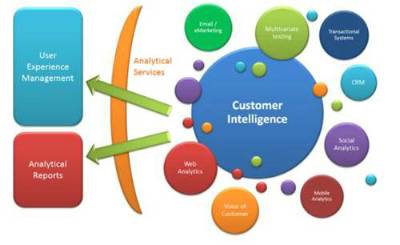Customer intelligence (CI) is the process of gathering and analysing information regarding customers; their details and their activities, in order to build deeper and more effective customer relationships and improve strategic decision making.
 CI and CRM
CI and CRM
Customer intelligence is a key component of effective customer relationship management (CRM), and when effectively implemented it is a rich source of insight into the behaviour and experience of a company's customer base. As an example, some customers walk into a store and walk out without buying anything. Information about these customers/prospects (or their visits) may not exist in a traditional CRM system, as no sales are entered on the store cash register
Process
Customer Intelligence begins with reference data – basic key facts about the customer, such as their geographic location. This data is then supplemented with transactional data – reports of customer activity. By mining this data, and placing it in context with wider information about competitors, conditions in the industry, and general trends, information can be obtained about customers' existing and future needs, how they reach decisions, and predictions made about their future behaviour.
Example sources of data for CI
Speech Analytics – used to monitor telephone conversations taking place between companies and customers, using phonetic analysis or speech to text to find keywords and phrases, classify call types and identify trends.
Click tracking – used to monitor the popularity and usage of corporate web sites, this data can provide clues to product interest and buying intention. For example, a company may infer a customer is interested in purchasing a particular service if they are spending time browsing specific product pages.
Customer Relationship Management – software solutions used for salesforce automation and to manage customer relationships which can store data on the quantity, type and category of customer and prospect contacts.
Frontline data capture which may (or may not) form part of a CRM software solution, but which is used by front line agents to record more subjective data regarding customer contacts, such as the root cause of the customer picking up the phone (e.g. they received their bill) or their emotional state.
Customer satisfaction and market research surveys, often mined via text analytics, which can additionally be applied, for customer intelligence purposes, to contact centre notes, e-mail, and other textual sources.